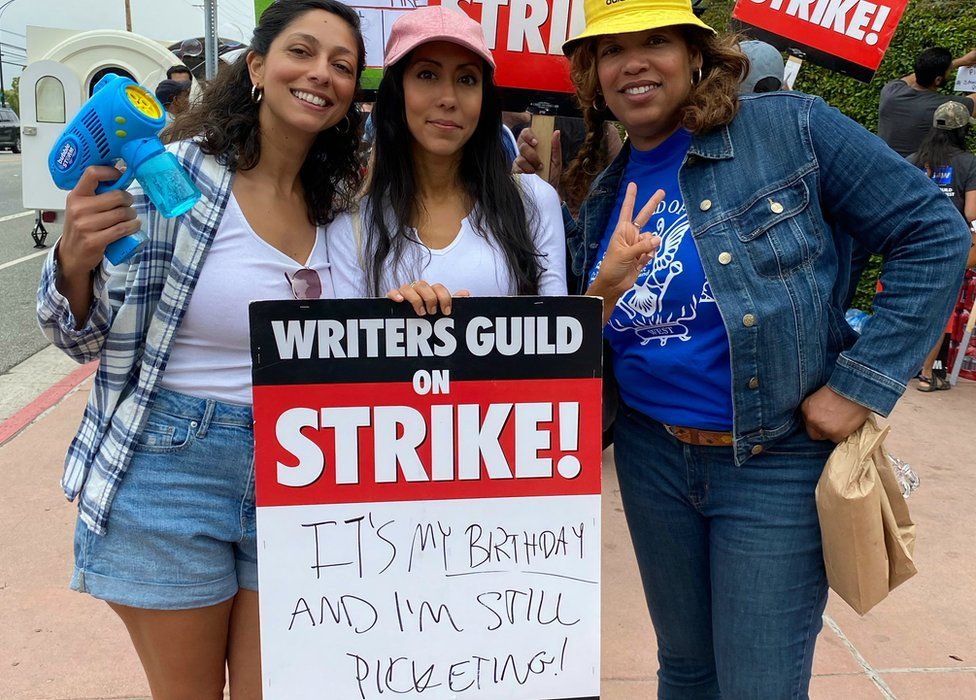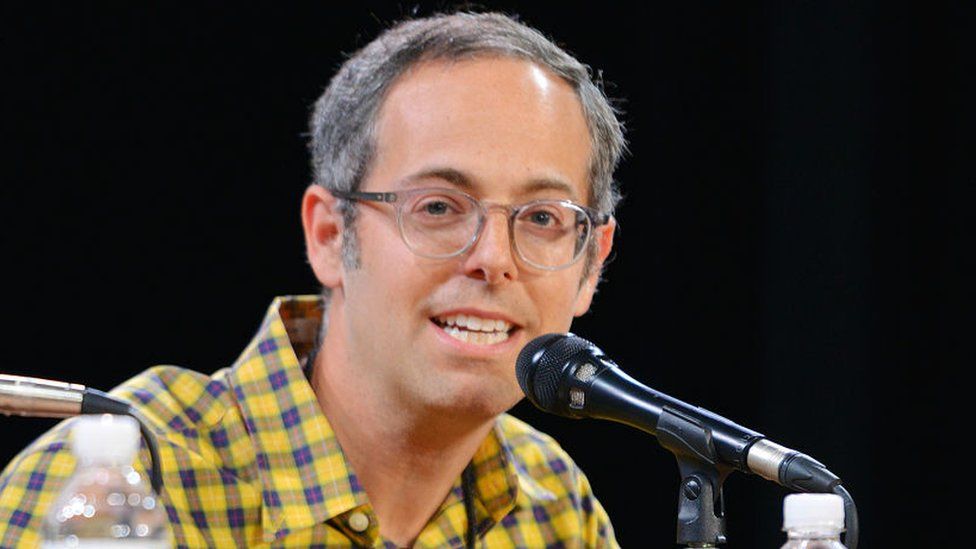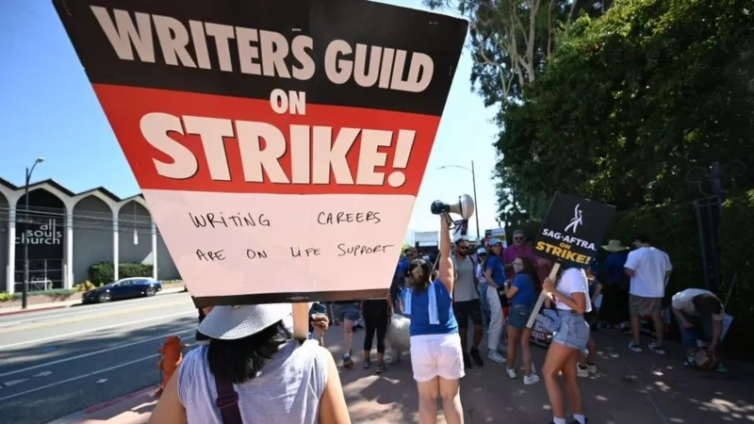Hollywood screenwriter Michelle Amor says she is fearful about the impact of artificial intelligence (AI) on her livelihood. "I don't want to be replaced with something artificial".
Ms Amor and fellow US television and film writers have now been on strike since the start of May.
One of their key demands is that the studios and streaming giants agree to limits on the future use of AI-powered writing tools, such as ChatGPT.
The writers and their union - the Writers Guild of America - want it in writing that AI can only be used for research purposes, and not to ever replace them.
"My mother's union job as a packer for 35 years was replaced with robotics," says Ms Amor, who currently has two TV projects in development - The Honorable and PG County.

"That's understandable because it's a labour intensive job, but we create art. Who wants a fake Picasso?"
Ms Amor, who says she is adamantly against the use of AI in screenwriting, adds: "We writers are the heart and soul of this entire industry. No-one works until we do - everyone knows it."
Fellow screenwriter Melissa Rundle says she was shocked at how quickly ChatGPT became a core issue of the ongoing labour dispute.
"I was surprised at first, because Chat GPT appeared seemingly out of nowhere - but as soon as I became more familiar with its ever-increasing capabilities it became a concern," says Ms Rundle.
She has written TV series Kung FU and the movie Cup Of Love, among numerous other projects.
"It's likely here to stay, and we need to cope with the disruption. Writers are not trying to stop progress - we're just trying to build in some basic protections against employers who have proven time and time again they won't hesitate to exploit us if given the chance."

Ms Rundle continues: "At a minimum, we are fighting for regulated use of AI on projects, and a firm understanding that it cannot write - or re-write - any literary material. Nor can it be used as a source material either.
"I saw a great sign on the picket lines that read 'AI doesn't have childhood trauma' and this is truly important.
As writers we are creating stories that touch people and oftentimes digging deep into our soul - this is storytelling at its most sacred and should never be robbed by a machine."
Elliott Kalan is a comedian and screenwriter, whose credits include The Daily Show With Jon Stewart and Mystery Science Theater 3000.
He says that one of the biggest challenges writers now face is the threat of studio executives using AI to generate original ideas for movies or TV series.
"Rather than buying an original screenplay or television series, or even hiring a writer to adapt an existing work into a new medium, they'll try to have a computer program spit out ideas for shows or movies - then pay a writer a small amount to rework it and make it presentable and interesting," says Mr Kalan.
"If that happens, writers will lose a lot of the compensation they should be receiving for their ideas and their work, as well as losing the chance to really contribute something meaningful to audiences."
Nevertheless, Mr Kalan can see the potential for AI to help writers. "Ideally, AI should remain an optional tool used for organising information - or for communicating ideas."

AI raises hard, important creative and legal questions for everyone, says Scott Rowe, a spokesperson for The Alliance of Motion Picture and Television Producers.
This is the trade association that represents the studios and streamers, such as Warner Bros Discovery, Disney, Netflix and Apple.
"We're creative companies and we value the work of creatives," says Rowe. "The best stories are original, insightful and often come from people's own experiences.
"For example, writers want to be able to use the new AI technology as part of their creative process, without changing how credits are determined, which is complicated given AI material can't be copyrighted. So it's something that requires a lot more discussion, which we've committed to doing."
Chung Xia is a founding partner of Silicon Valley-based technology investment firm TSVC. He envisages a future where sitcom writers use AI-generated scripts as a foundation for further development.
"AI algorithms will analyse existing scripts, comedic patterns, and audience responses, to generate content with comedic timing, character dynamics, and engaging storylines," he says.
"Writers will then infuse their creative expertise, adding their wit, humour, and original ideas to refine the AI-generated material."
He adds that this collaborative process between AI and human writers will optimize comedic impact, pacing, and character development.
"Through this iterative approach, AI will provide data-driven insights that aid in creating resonant storylines for the target audience. Ultimately, the integration of AI-generated content and human creativity will lead to enhanced sitcom scripts that maintain their unique voice, while benefiting from the AI-generated insights."
John Pollono, a writer, director and actor, is not impressed with the suggestion that AI can be used to write the first drafts of scripts.
He says that the idea of AI "scouring" all past movie scripts "to inform future ones" is "messed up and incestual". "It is like using the same playdough over and over again."
Mr Pollono, who has written the screenplay for upcoming comedy crime movie Riff Raff, which will star actors Jennifer Coolidge and Brian Cox, adds that writers are at risk of having their voices "robbed".
However, fellow screenwriter Sara Bibel says AI will never be any good at creative writing.
"It's a glorified auto-correct that throws together random combinations of words based on coding," says Ms Bibel, whose writing credits include long-running US TV series The Young & The Restless.
"All it does is plagiarize what has been fed into the system and is not capable of writing anything."
Latest Stories
-
All payments received from our contract with GRA are performance-based, says SML
17 mins -
Marrakech 2024: Ghana’s para-athlete Zinabu Issah wins Gold
18 mins -
Our contract with GRA followed due process; ignore contrary reports – SML
19 mins -
SML is just Agyapa in suit and tie – Bright Simons
55 mins -
Domelevo condemns selection of KPMG to audit GRA/SML contract as illegal and unprofessional
1 hour -
SML/GRA contract: OSP should have released its report by now – Inusah Fuseini
2 hours -
KPMG report exonerates us – SML
2 hours -
Works and Housing Ministry seeks lasting solutions to challenges with stakeholders engagement
2 hours -
President’s statement on GRA-SML contract underlines Fourth Estate’s revelation – MFWA
2 hours -
Our services are one of a kind, not done by NPA – SML insists
2 hours -
We operate legally and collaborate with world-class partners – SML
2 hours -
Director urges parents to protect children from abuse
3 hours -
Imani-Ghana criticises Akufo-Addo for not lauding Fourth Estate’s contribution to social development
3 hours -
Man remanded for allegedly stabbing businessman with broken bottle and screwdriver
3 hours -
Population in Kumasi Central Prison surges to 1800, threefold exceeding capacity
4 hours

